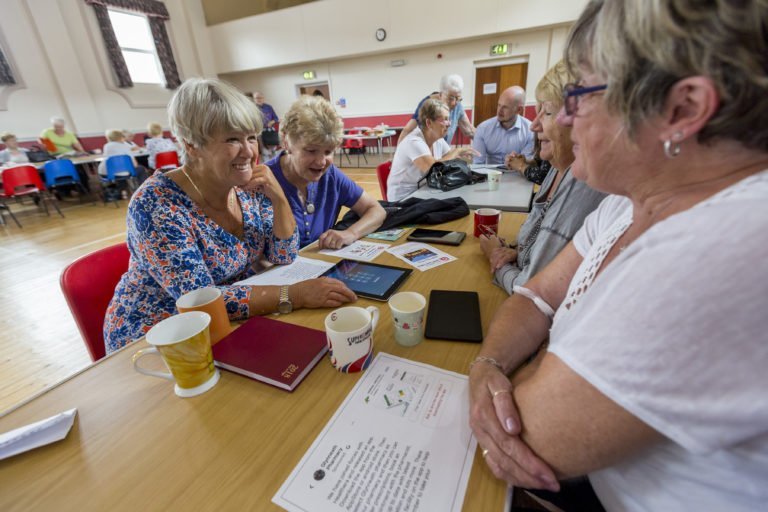Work still to be done for Wales to become a digitally-inclusive nation
“Those ‘left behind’ are at risk of falling further behind if we do not tackle the stubborn levels of digital exclusion that persist”- Professor Hamish Laing, Chair of the Digital Inclusion Alliance for Wales
An influential group of 40 organisations across the public, private and third sector are calling for an end to digital exclusion in Wales.
The Digital Inclusion Alliance for Wales (DIAW), comprising the likes of BT, Dŵr Cymru, Citizens Advice Bureau, Disability Wales, Older People’s Commissioner and Public Health Wales, has today (Thursday 18th March) published an Agenda for digital inclusion which highlights five areas it would like to see prioritised over the next five years so that everyone in Wales, who needs and wants to, can access and benefit from the internet and digital technology.
Digital Inclusion Alliance for Wales (DIAW) Agenda – five priority areas
- Embedding digital inclusion across all sectors
- Mainstreaming digital inclusion in health and social care
- Addressing data poverty as a key issue
- Prioritising digital skills in the post-Covid economy
- Setting a new minimum digital living standard
The National Survey for Wales found that 90% of adults (aged 16 and over) said they personally use the internet in 2019/20. This is up from 77% in 2012/13 but according to Professor Hamish Laing, Chair of the Digital Inclusion Alliance for Wales, this still falls short of where Wales needs to be as a digitally-inclusive nation. He said:
“Although the internet has been with us for 30 years, the growth of daily online activity in recent years has been dramatic. From shopping to banking, learning to socialising – for many of us, digital is now the default. However, as our need grows for affordable, secure, reliable access to the internet to participate in daily life, tackling digital exclusion in a meaningful and holistic way becomes more urgent.
“Covid-19 has shone a bright light on the country’s digital inequalities. Many children and young people have been unable to access learning online, patients have been unable to take part in video consultations, relatives have been unable to connect with loved ones isolated in hospital or care homes…the list goes on.
“Addressing digital exclusion is essential for a just and equal society and it requires sustained intervention, resourcing, and prioritising. Those ‘left behind’ are at risk of falling further behind if we do not tackle the stubborn levels of digital exclusion that persist. A great deal has already been achieved by Welsh Government and other local digital inclusion initiatives in Wales but there is still more work to be done.”
Digital Communities Wales: Digital Confidence, Health and Well-being is a Welsh Government funded programme which is delivered by the Wales Co-operative Centre in partnership with the Good Things Foundation and Swansea University. Since 2019 the programme has been proactively working with all seven health boards in Wales to help tackle digital exclusion. The support ranges from practical training for clinical staff and other health professionals to develop their digital skills, to strategic support to help senior health executives integrate digital inclusion into their public-facing services.
Jocelle Lovell, Director of Inclusive Communities at the Wales Co-operative Centre and member of DIAW, welcomes the latest recommendations. She said:
“The rapid growth in digital technologies brings amazing opportunities for people to become more active partners in their own care. But there is also a serious risk that people who are digitally excluded get left behind.
“Without access to the internet, it can be difficult to find information, get answers to questions, and verify what is being reported. Internet access and basic digital skills also brings wider benefits that have been particularly important for many older people during the pandemic, such as helping them to stay connected with family and friends and access useful online services including the delivery of food or medication.
“We must ensure that each person in the Welsh and social care workforce, including those who are unemployed and seeking work in these difficult circumstances, is given the necessary training to develop the digital skills needed to participate safely and effectively in the post-Covid digital economy.”
The Alliance will seek collaboration with Welsh Government to position digital inclusion as a cross-cutting priority for all areas – including anti-poverty initiatives and national well-being. DIAW will also be working with key stakeholders over the coming months to ensure digital inclusion is mainstreamed across the public, private and third sectors.
BT, an active member of DIAW since its formation last year, have already invested in a range of initiatives and campaigns to tackle digital exclusion across Wales, including the Skills for Tomorrow programme. Nick Speed, BT Group’s Director in Wales, said:
“The pandemic has clearly shown the vital role digital technology and internet connectivity now plays in all our lives. But this increased reliance on connected technology has highlighted challenges, as well as opportunities. It’s underlined the digital divide that now exists, not just in terms of access to digital devices and coverage, but also digital skills in households and business, both in cities and rural communities.
“We look forward to continuing our work with DIAW and other partners to highlight and address the barriers facing connectivity and digital skills in Wales.”


